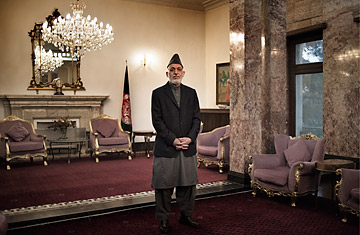
Pressure on Afghan President Hamid Karzai will increase as NATO begin to leave his country.
(2 of 10)
The question of immunity is particularly sticky. You have asked for limits on immunity for U.S. forces, why?
Well, if immunity means giving the ability to someone like the gentleman who killed people in Panjwai and Kandahar, or if immunity means bombardment of our villages, and getting immunity for that, that the Afghan people will not accept, that will be extremely difficult for the Afghan people to accept. And I hope the United States will understand.
[Interrupts to offer coffee, water and tea.]
So that will be very difficult. But we are willing to negotiate with the United Sates, where the U.S. will understand the Afghan circumstances, and respect the lives and values of the Afghan people and whereby most important question here, especially after the signing of the partnership agreement is that the Afghan people have told me clearly when I began to consult with them on the partnership agreement two years ago, they repeatedly and at all the meetings, they said, 'President, sign the partnership with America, so peace can come to Afghanistan.' So they have signed the partnership with the United States, for the hope, in the hope that Peace will come to Afghanistan, and that stability will come with it, and that the Afghan life and property will not be violated. So for us it was not only a document towards the future, it was also a document that turned a new page in relations between us and the United States, a new page in which theprevious page is gone, and we don't want to look at it anymore. And the new page is where no raids on Afghan homes will be conducted, no Afghans will be arrested, no violation of Afghan homes will take place, no bombardment of Afghan villages will take place, for we have already and for years have said that the war on terror is not in the Afghan villages and towns. From that perspective we have signed it, and if that is fulfilled, the next stage of the security agreement will be easy. If that is not done, then the people have no reason to go into a security agreement.
You have made clear your stance on air strikes, yet NATO strikes have mistakenly killed several civilians in the past two weeks. How has this affected relations?
It is a serious issue. I have raised it with the U.S. government and NATO. Its something we take extremely seriously, and it is something wewill be talking about to the NATO leaders in Chicago.
You said at the time that if it happens again Afghans may have to reconsider the security agreement.
Of course. What is the partnership for? What are the Afghan objectives of a partnership with the United States? Well, it has negatives for us too. Neighbors don't like it; the region doesn't like it. We will be paying a price for this.
And the insurgent groups don't like it.
Well the insurgent groups are mostly related to the neighbors. But the neighbors...in any case the neighbors don't like it and the region doesn't like it and we are falling into a rivalry which isn't ours and which we can't pay for. Therefor what is it in this partnership that Afghans will get, that they are seeking, knowing that all the neighbors don't like it. It is the security of Afghanistan, the return of peace to Afghanistan, and it is the build up of the Afghan state structure. The institutions of state governance, the military, the police, and the assistance that it should bring to Afghanistan. Which is what this agreement should bring.
Do you have a number of foreign troops you would like to see?
Well the number of troops is not so much an issue. Of course the bulk of the current troop...the troops will all leave Afghanistan by 2014. So after that as a result of the agreement, if there are 10,000 or 15,000 or more or less is something that the U.S. has to decide. But the partnership that we signed, also addresses that. The security agreement would address the scope, the responsibilities, the obligations and the hows and wheres of thesecurity arrangements.
What do you think would be ideal for Afghanistan, in terms of numbers. If you had your wish?
Well we of course would like to have a security agreement that completely respects the sensitivities of the Afghan people and Afghan laws, and is not seen by the Afghan people in any way as reducing from their sovereignty or their well being, and that it provides good guarantees to the region and neighbors that Afghanistan will not be used against them.
But that is what you have already. So going forward in terms of concrete commitments, what would you like to see in the next step?
Well, clear support to the Afghan forces. We have a force of 350,000 right now, but its more a ground force. Without the tools of a modern military. We must have aircraft, our radars, we must have our...all other necessities for a good army met. And Police. And our economy must grow well, and the conditions that I had earlier, the security.
You want the Americans to assist with the delivery of air force, radar and economic assistance?
We must be a properly equipped country.
